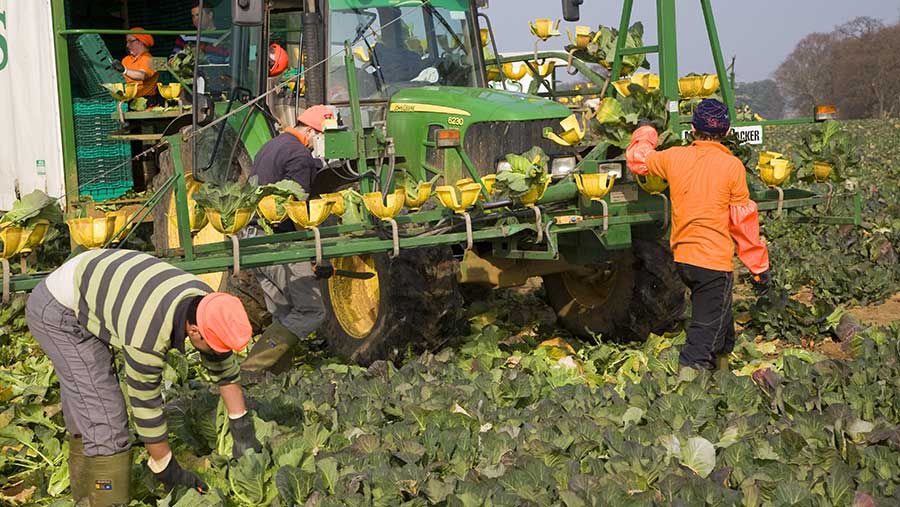Visa scheme announced for migrant farmworkers
 © General Images / UIG/REX/Shutterstock
© General Images / UIG/REX/Shutterstock British growers will be allowed to recruit non-EU migrant workers for temporary jobs on UK farms after Brexit under a pilot scheme announced by the government.
The two-year pilot allowing 2,500 migrant workers to come to the UK for up to six months was announced by Defra and the Home Office on Thursday (6 September).
See also: 10-point plan for attracting the best farm workers
The government said the scheme would alleviate seasonal labour shortages during peak production periods for fruit and vegetable farmers.
The NFU – which has long warned of labour shortages – said there was “work to be done now to examine the detail” and develop the scheme.
Soft fruit production in the UK has grown by 130% in the past 20 years.
Technology
To ensure this growth continues, the government said farmers must also look at ways technology can reduce demands for physical labour.
The pilot scheme would support farmers in the short term during peak production periods because automated harvesting solutions were not universally available.
The time-limited pilot would also explore how to keep British horticulture competitive, as almost all other OECD countries sourced seasonal workers to pick fruit and vegetables.
Home secretary Sajid Javid said: “British farmers are vital to the UK’s economy – and the government will look to support them in any way we can.
“This pilot will ensure farmers have access to the seasonal labour they need to remain productive and profitable during busy times of the year.”
‘Sustainable immigration’
“I am committed to having an immigration system that reduces migration to sustainable levels, supports all industry and ensures we welcome those who benefit Britain.”
The scheme will be run by two operators – to be announced in due course – that will oversee the placement of the workers.
They will ensure suitable workers are selected for the pilot, reach their place of employment, and leave the UK at the end of their visa.
Return rates will be monitored throughout the duration of the scheme, with provisions to close the route if the government deems that it presents a threat to immigration control.
To be eligible for the scheme, migrant workers must be aged at least 18 years on the date of application and be from outside the European Union.
The pilot will commence in the spring of 2019, run until the end of December 2020 and will be monitored closely by the Home Office and Defra.
Powerful arguments
Defra secretary Michael Gove said: “We have listened to the powerful arguments from farmers about the need for seasonal labour to keep the horticulture industry productive and profitable.
“From lettuce in East Anglia to strawberries in Scotland, we want to make sure farmers can continue to grow, sell and export more great British food.”
Mr Gove said the government would review the pilot scheme’s results as it looked at how best to support the longer-term needs of industry outside the EU.
Scheme operators will be licensed by the Gangmasters and Labour Abuse Authority to ensure migrant workers are protected against modern slavery and other labour abuses.
It will ensure all workers are placed with farms that adhere to all relevant legislation, including paying the national minimum wage.
Farmers will also be vetted to ensure living and working conditions are of a suitable quality.
‘Step in right direction’
NFU president Minette Batters described the new pilot scheme as “a big step in the right direction”.
“We have been telling government all along that we have strong evidence about the need for such a scheme, and it seems our lobbying has paid off,” she said.
Ms Batters described the 2,500 places that will be offered in the pilot scheme as “meaningful”.
“Had it just been a few hundred, or had the scheme been regionalised, we would have been disappointed,” she said. “But this pilot is going to be broad and accessible. We appreciate the leadership Defra secretary Michael Gove and home secretary Sajid Javid have shown on this.”
